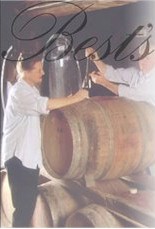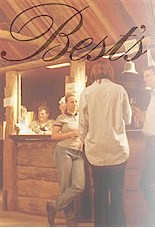


Best's Victorian enterprise comprises three sister vineyards: The Grand Matriarch and headquarters, Concongella at Great Western, St Andrew's at Lake Boga and the baby Salvation Hills at Rhymney Reef. Each vineyard produces distinctly different grape characteristics from vines aged from five to 135 years. Together they add fascinating facets, contrasts and diversity to Bests stable of wine. Twenty-one hectare Concongella, enjoys a cool temperate climate.

The newest, 22-hectare Salvation Hills also in the Great Western region is slightly cooler while the third, 28- hectare St. Andrews, lies 237 km further north near Lake Boga in the Swan Hill region and has a warm, temperate climate.
Bests Concongella Vineyard at Great Western was established in 1866. The 'Concongella' estate takes its name from the picturesque Concongella creek that lazily meanders beside the vineyard. Meanwhile the premier wine-growing region of Great Western ("one of the best in the country" notes wine writer Hugh Johnson) takes its name from the nearby old gold mining village of Great Western, some 240km west of the City of Melbourne.
Unique factors of soil and climate contribute to Best's success. The land along the creek is flat with a powdery, limey loam overlaying a deep clay sub-soil while newer plantings are cited on a frost-free gravel hill. Climatically cold to very cold winters, and frequently dry and cool summers, with occasional bursts of hot weather, are the norm.

Viv Thomson believes a little stress concentrates grape flavour, at Concongella it happens naturally. Despite these natural adversities, Concongella consistently produces high quality grapes of intense flavour. The vineyard is a blend of old and new plantings, Shiraz, Pinot Meunier, Dolcetto and Rhine Riesling being among the former and Chardonnay, Pinot Noir, Merlot and Cabernet Franc, the latter.
Best's St Andrew's Vineyard at Lake Boga was established in 1930. The more stable and reliable weather conditions at St. Andrews complements the more rigorous and diverse climatic Concongella conditions. The limestone soils of St. Andrews, together with the warm, dry climate produce smooth, fresh soft wines with above average fruit flavours which Bests often enhance with touches of quality oak.
With the sale of St. Andrews in 1928, the pot-still was moved to Concongella and later to the new St. Andrews. Today, the original still adorns the wall of the St. Andrews tasting room, with a new pot-still now inuse. The production of grape fortifying spirit and fortified wines has played an important role in Thomson enterprises.
However, with the decline of interest in fortified wines and the Governments increased excise on brandy, sales have decreased steadily since the 1970s. St. Andrews gives today's generations of Thomsons a strong hand, contrasting nicely with Concongella. The combination of a warm, temperate climate and tough limestone soils, produce grapes with good fruit flavours.

























